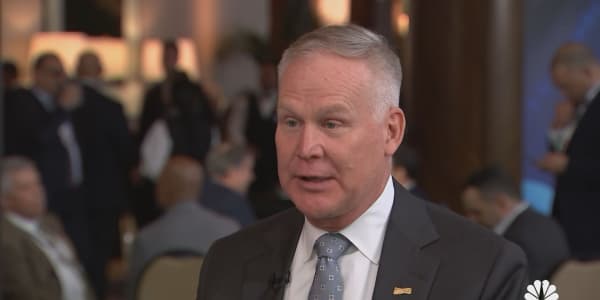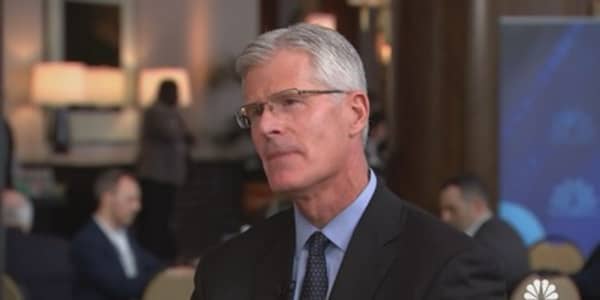Even with chilly tensions this week on the political stage, the cooperation between the U.S. and Russia in the energy industry is large and growing.
The topic of Russian "tight oil" (or shale oil) highlighted intertwined relationships at the annual IHS CERAWeek energy conference, and a Rosneft executive said that he wants more contracts with U.S. companies as the world looks to Russia's vast shale reserves as a future field of bounty.
So far, industry executives say they have seen no impact on business since Russia moved troops into Crimea last week.
The U.S. Energy Information Administration has called Russia's shale reserves the largest in the world, and one Russian oil executive at the conference said they were "somewhere between huge and humongous."
The U.S. and Russia are now neck-and-neck in energy production. The U.S. produces more natural gas than any other country. Russia is the world's biggest oil producer, but the tight oil reserves show much more promise.
(Read more: As geopolitical tensions rise, US cushions energy prices)
"The geology is relatively formidable, but there are still obstacles," including tax hurdles, regulation and equipment, said John Webb, IHS director of Russian and Caspian energy. The Russian reserves include the Domanik, in the Volga-Urals region, and the Bazhenov in Siberia, similar to North Dakota's Bakken, he said.
"More U.S. companies are moving to Russia to manufacture rigs," said Eric Liron, first vice president of Rosneft, Russia's largest oil company, while part of a panel discussion on Russian tight oil. In a later comment, he said, "we are in discussions with some companies in Houston."
Muted reaction
The U.S. is the leader in shale drilling, and its industry was driven initially by small independent drillers. Russia does not have a large number of independents, and its huge shale assets are seen as an opportunity for the U.S. industry to participate further.
The IHS CERAWeek conference is underway in Houston as Secretary of State John Kerry visits Ukraine to show U.S. support for its new government. Much of the dialogue about Ukraine at the conference has focused on gas pipelines that carry Russian gas across Ukraine to Europe and on the European Union's dependence on Russia for oil and particularly gas imports.
(Read more: The Ukraine pipeline threat to Europe)
Experts on Russia, speaking later at the conference, said the European dependence on Russian energy may result in a more muted reaction to Putin's incursion into Crimea.
Angela Stent, a professor at Georgetown University and an expert on Russian-U.S. relations, said a major difference from the Soviet era is that the Russian economy is now integrated with the world economy.

"This is not the cold war, but it certainly is the worst time between Russia and the West since the collapse of the Soviet Union," said Stent, author of a new book called "The Limits of Partnership."
Liron and other industry executives at the conference said they see no change in their business operations after Russian troops moved into Crimea.
"The only difference is we have to make sure our people who work in this country are safe," he said.
(Read more: New guidelines for rail oil shipments)
Earlier Tuesday, Russian President Vladimir Putin said he saw no need to send troops further into the country but left the possibility open.
He also said military action had been necessary for Russia to defend its installations on the Crimean peninsula and after the collapse of Ukraine's government. Ousted President Viktor Yanukovych is the country's only legitimate leader, he added.
Wait-and-see posturing
Russian Energy Minister Alexander Novak was scheduled to speak at the conference Tuesday but withdrew over the weekend. Nonetheless, representatives of the Russian oil industry were there.
Patrick Schorn, president of operations and integration at Schlumberger, said so far there has been no impact from the tensions between the U.S. and Russia. On Monday, the U.S. dropped trade and investment talks with Moscow.
"I think everyone is looking at how it is unfolding," he said after appearing on the Russian oil panel.
"At the moment, it is not quite clear how it would affect business in any way," said Schorn, adding that Schlumberger is always monitoring its employees' security.
(Read more: Tapping 100 years of US energy at light speed)
Alasdair Shiach, president of Russia-Caspian at Baker Hughes, said the Russian tight oil story is very promising—much like the early days of the North Sea. He said his business is adding to its 3,000 employees in Russia.
Russia very much needs internal investment, he said, and the energy industry is an important part of that.
"A lot of their problem is capital flight," Shiach said.
—By Patti Domm. Follow her on Twitter @pattidomm.






